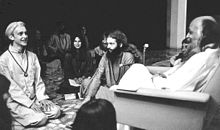
Back حركة راجنيش Arabic Neo-Sannyas German Movimiento osho Spanish جنبش راجنیش Persian રજનીશ ચળવળ Gujarati オショウ・コミューン Japanese Ošo meditacija Lithuanian Bhagwanbeweging Dutch Oshobevegelsen NB ਰਜਨੀਸ਼ ਅੰਦੋਲਨ Punjabi
 Rajneesh (rightmost) and disciples in darshan at Poona in 1977 | |
| Founder | |
|---|---|
| Rajneesh | |
| Regions with significant populations | |
| Countries India, Nepal, Germany, Italy, The Netherlands and United States Communities Antelope, Oregon, Pune, Rajneeshpuram, The Dalles, Oregon, Wasco County, Oregon | |
| Religions | |
| Teachings of Rajneesh |
The Rajneesh movement is a religious movement inspired by the Indian mystic Bhagwan Shree Rajneesh (1931–1990), also known as Osho.[1] They used to be known as Rajneeshees or "Orange People" because of the orange they used from 1970 until 1985.[2] Members of the movement are sometimes called Oshoites in the Indian press.[3]
The movement was controversial in the 1970s and 1980s, due to the founder's hostility, first to Hindu morality in India, and later to Christian morality in the United States. In the Soviet Union, the movement was banned as being contrary to "positive aspects of Indian culture and to the aims of the youth protest movement in Western countries". The positive aspects were allegedly being subverted by Rajneesh, whom the Soviet government considered a reactionary ideologue of the monopolistic bourgeoisie of India and a promoter of consumerism in a traditional Hindu guise.[4]
In Oregon, the movement's large intentional community of the early 1980s, called Rajneeshpuram,[5][6] caused immediate tensions in the local community for its attempts to take over the nearby town of Antelope and later the county seat of The Dalles.
At the peak of these tensions, a circle of leading members of the Rajneeshpuram Oregon commune was arrested for crimes including an attempted assassination plot to murder U.S. Attorney Charles H. Turner[7] and the United States's first recorded bio-terror attack calculated to influence the outcome of a local election in their favour; these efforts ultimately failed. In the bioterror attack, Salmonella bacteria were deployed to infect salad products in local restaurants and shops, which poisoned several hundred people.[6] The Bhagwan, as Rajneesh was then called, was deported from the United States in 1985 as part of his Alford plea deal following the convictions of his staff and right hand Ma Anand Sheela, who were found guilty of the attack. After his deportation, 21 countries denied him entry.[8] The movement's headquarters eventually returned to Poona (present-day Pune), India. The Oregon commune was destroyed in September 1985.[9]
The movement in India gradually received a more positive response from the surrounding society, especially after the founder's death in 1990.[10][11] The Osho International Foundation (OIF) (previously Rajneesh International Foundation [RIF]), is managed by an "Inner Circle" set up by Rajneesh before his death. They jointly administer Rajneesh's estate and operate the Osho International Meditation Resort in Pune.[11][12]
In the late 1990s, rival factions challenged OIF's copyright holdings over Rajneesh's works and the validity of its royalty claims on publishing or reprinting of materials.[10][13][14] In the United States, following a 10-year legal battle with Osho Friends International (OFI), the OFI lost its exclusive rights over the trademark OSHO in January 2009.[15]
There are a number of smaller centres of the movement in India and around the world, including the United States, the United Kingdom, Germany, Italy, and the Netherlands.
- ^ Idinopulos & Yonan 1996, p. 13
- ^ Chryssides 2001, p. 208
- ^ Abhay Vaidya (27 May 2005). Oshoites amused by American terrorism tag, The Times of India. Retrieved 15 July 2011.
- Sunanda Mehta (27 April 2008). Maroon-clad Oshoites no longer endemic to city, The Indian Express. Retrieved 15 July 2011.
- Chandran Iyer (10 June 2009). Osho Commune 'least interested in Indians', MiD DAY. Retrieved 15 July 2011. - ^ A. A. Tkacheva, Counter-culture Slogans in the System of Right Wing Radicalism in India (1986) English abstract
- ^ Clarke 2006, p. 253
- ^ a b Lewis 2005, pp. 124–127
- ^ FitzGerald 1986, p. 108
- ^ Aveling 1999, p. xxii
- ^ "Welcome to Osho World". oshoworld.com.
- ^ a b Lewis 2005, p. 120
- ^ a b Urban 2005, pp. 182–183
- ^ Lewis 2005, pp. 133–134
- ^ Osho's Legacy; Royalty Ruckus originally published in India Today 3 July 2000. Retrieved 7 December 2009.
- ^ Fox 2002, pp. 44–45
- ^ (18 July 2009) Osho trademark:OIF appeal dismissed, The Indian Express. Retrieved 15 July 2011.
© MMXXIII Rich X Search. We shall prevail. All rights reserved. Rich X Search